Annie Murphy and ‘Black Mirror’ Director on “Joan Is Awful’s” Feminist Themes and “Spookily Timely” AI Story
- Oops!Something went wrong.Please try again later.
- Oops!Something went wrong.Please try again later.
- Oops!Something went wrong.Please try again later.
- Oops!Something went wrong.Please try again later.
- Oops!Something went wrong.Please try again later.
- Oops!Something went wrong.Please try again later.
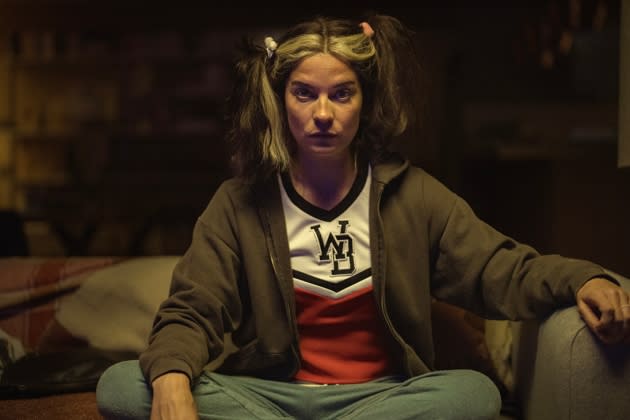
[This story contains spoilers from Black Mirror’s season six episode “Joan Is Awful.”]
A day before Black Mirror’s sixth season debuted on Netflix, actresses Annie Murphy and Salma Hayek made a surprise appearance during the inaugural live taping of I Like to Watch at Netflix’s Paris Theater in Manhattan. With drag queens and I Like to Watch co-hosts Trixie Mattel and Katya, the duo playfully recorded a series of segments in front of a predominantly LGBTQ audience for a reaction episode to “Joan Is Awful.”
More from The Hollywood Reporter
Miss Benny on Bringing a Fabulous Gender-Nonconforming Character to Life on Netflix's 'Glamorous'
Paris Olympic Organizers' Headquarters Searched in French Corruption Investigations
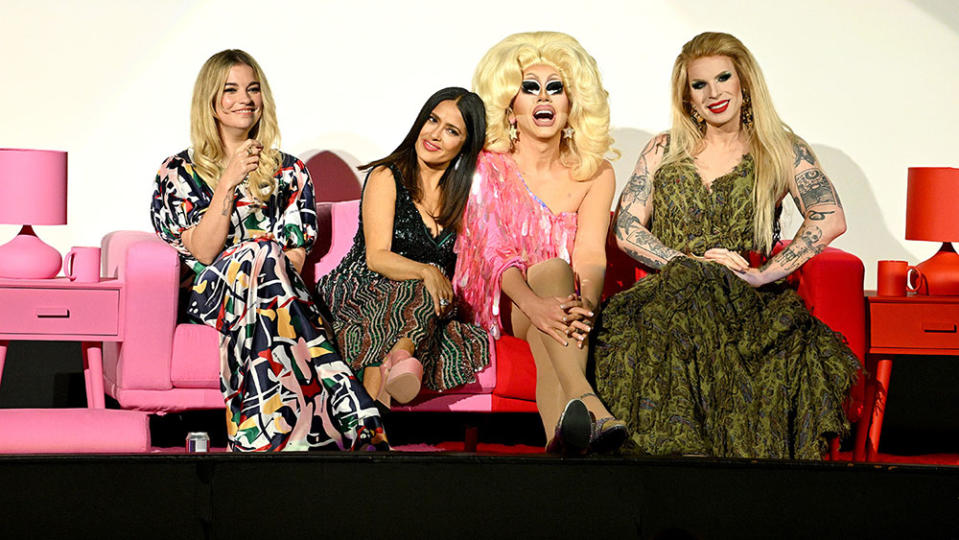
Director Ally Pankiw (The Great, Feel Good, Shrill) was also present, taking the mic to not only thank the audience and celebrate the work of the cast and crew, but also to introduce an early screening of the season six episode in Charlie Brooker’s Emmy-winning sci-fi anthology series. It’s a storyline creator and writer Brooker told Vanity Fair was inspired by social media’s “main character syndrome,” and another Emmy-winning limited series about one of Silicon Valley’s biggest controversies.
“One of the things I was thinking about [in creating ‘Joan’] was deepfakes and AI-generated imagery. I’d been toying with an idea about a news network that just pumps out deepfakes and calls it drama. I couldn’t work out what the actual story was, but it was a scary idea,” Brooker told the magazine. “And then when I watched [Hulu’s] The Dropout with my wife, we were like, ‘This feels like it happened 10 minutes ago! Imagine if Amanda Seyfried, while playing Elizabeth Holmes, switches on the TV and sees The Dropout.'”
The episode, which follows a woman named Joan (Murphy) whose life becomes the central material for a series starring Salma Hayek on a Netflix-like platform named Streamberry, is a cautionary tale about the rise of artificial intelligence and the content creation ecosystem amid the streaming era.
While Brooker has always been eerily timely with his topical explorations in Black Mirror, the arrival of this particular episode — as Hollywood unions like the WGA strike and SAG-AFTRA continue to negotiate with the AMPTP over industry-shifting issues like AI — is nearly too on the nose. So much so, Pankiw — who called Brooker a “prophet” while speaking to The Hollywood Reporter ahead of the live taping event — showed support for the WGA strike as she introduced the film to a packed audience.
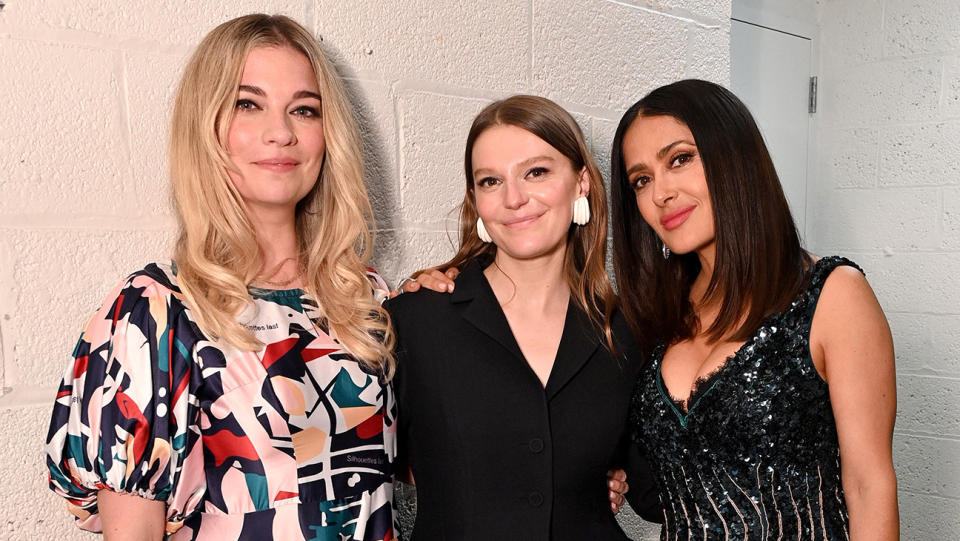
But for the director and Murphy, “Joan Is Awful” isn’t just incredibly timely in terms of industry happenings. It’s also an opportunity to look at the ways women are consumed in pop culture and their relationships to one another.
THR spoke to Pankiw and Murphy ahead of Black Mirror‘s season six debut about how “Joan Is Awful” shows solidarity between women, how the director built an inclusive team to tell this incisive story and what the episode says about the current labor movement in Hollywood.
This season has been a long time coming. What about “Joan Is Awful” appealed to you, and did you expect it to be so timely?
ALLY PANKIW When I got the script, I was like, “I’ll kill someone to do this.” (Laughs.) Charlie Brooker is a prophet. He’s just like, “I don’t know. I read the news,” and you’re like, there’s something else going on. (Laughs.) Authenticity and autonomy over telling our own stories is obviously always topical, and I think everything that we’re talking about existentially and in culture about AI, that’s been topical for a minute. But I think what’s become spookily timely, in terms of the writers strike and the larger conversations that are happening in our industry, is this idea of who gets to make art, who gets to tell their stories, what happens when we consume other people’s stories, and other people’s lives? It’s a big, collaborative communal experience making art and consuming art. It’s all linked and everyone’s connected, and I think this episode speaks to that in a really interesting and nuanced way.
What conversations were you having with Charlie Brooker about coming into this season and what he wanted to achieve with this episode?
PANKIW I spoke to him mainly about this episode, because they’re all kept a little bit separate and secret. But he’s such a comedian and such a strong comedic writer, and I think having an episode that he got to play in that arena a little bit more was really exciting to him, and to myself as a comedy and drama director. When I got the call that they were going to send me a Black Mirror script, I was like, “I can’t do spooky things, so I don’t know why they would.” And they were like, “No, it’s a comedy — a female-driven comedy episode. So they’re looking for a female comedy director.”
Charlie was super collaborative. We got on the phone, and I was like, “It’s about consent and how we consume women and pop culture.” And he was like, “Oh yeah, I also thought it was weird how you don’t know what you’re signing.” (Laughs.) So it was fun to build in all these layers with him and get to build out the world of these female relationships. I wanted to bring a lot of that to it, sort of how we consume women as other women. He was very open and collaborative to that feminist lens that I thought was an undercurrent in it.
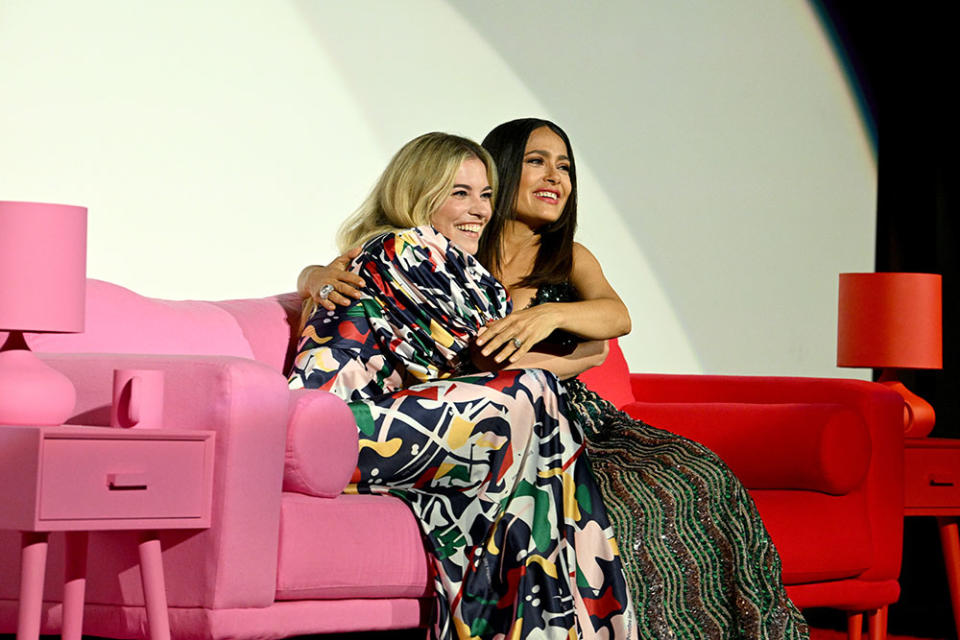
A key part of how Streamberry’s efforts ultimately fail is that two women stand together in solidarity. It feels very pointed at this time in Hollywood, particularly in terms of the labor atmosphere around the WGA strike and SAG-AFTRA negotiations. How important is that solidarity theme to you, both in the episode and offscreen?
ANNIE MURPHY I’m glad that you saw that because it was an ongoing conversation that we had on set with Ally and between Salma and I. It was so crucial that it was the most uplifting female empowerment story of two women coming together. I know, it’s so corny to say these days, but it’s true. It was really important to both of us that it was these two women coming together in the face of the man and the machine who are trying to ruin their lives for capital gain. I’m so proud of it.
Charlie Brooker, who wrote it, was so sweet. We had a couple of rehearsals where he showed up with his laptop open, and he would clack away as we gave him some of our thoughts. He was so behind that concept of solidarity. Moving into the real world, what else can we do? I feel like we’re at such a tipping point, a really scary tipping point, when it comes to AI, especially. There has not been anywhere close to enough questions asked or answered about what the repercussions can and will be if we keep going at the rate that we’re going. The writers strike is such a mindfuck because it’s human beings asking not to be replaced by computers, and the fact that we are alive in a time when people are having to ask and beg for their jobs not to be replaced by computers — it hurts my guts.
Ally, you hired pretty inclusively on this episode, not just in terms of who was onscreen, but who was working on your crew. Was that something you intentionally wanted to do for this story?
PANKIW All of my sets are very diverse, for lack of a better word. It’s just what my community, friend groups, collaborators, family and world look like. So when I’m jibing with people creatively, that happens to be who I end up feeling like my tastes align with. Our amazing composer is named Ames Bessada. They’re a nonbinary composer that I’ve known from Canada and worked with a lot on my other projects. This episode is actually very Canadian (laughs), and our DP Catherine Lutes is a woman who is also originally from Toronto. I’m proud because our episode features the first female cinematographer in all of Black Mirror. A lot of our crewmembers were queer, and a lot of our castmembers are queer. And for the most part, our heads of department, other than our production designer, were female.
The storylines weren’t necessarily about that, but generally the types of stories I like to tell are when you’re populating worlds with people who are queer and female, and you’re not making them talk about that. They just exist in the world, alongside poop jokes. (Laughs.) I mean, Salma and Annie are a perfect buddy comedy duo. Their chemistry was through the roof, so maybe we could call their chemistry queer. (Laughs.) But centering female friendships is also really important to me. We all know women get siphoned off in stories all the time, and they don’t often get to talk to each other in film and TV. They’re isolated with a big cast of male characters. I loved this episode because it didn’t do that. It just let women from different walks of life interact with each other onscreen and be in a bunch of different relationships.
Speaking of queer energy, you have Cate Blanchett, who is somewhat of an icon in the queer community, in a Streamberry cameo for this episode. How did that happen?
PANKIW Charlie, I think, wrote her a very lovely letter. And it was sent to her agent, who someone else knew. One of our lovely producers, Jess Rhoades, was such a key part also in casting this and fighting for the right people. She was incredible. But yeah, I think they said, “Look, like we want to reference you in this very flattering light, and is that OK?” And someone on her team said yes. I hope she’ll be very flattered.
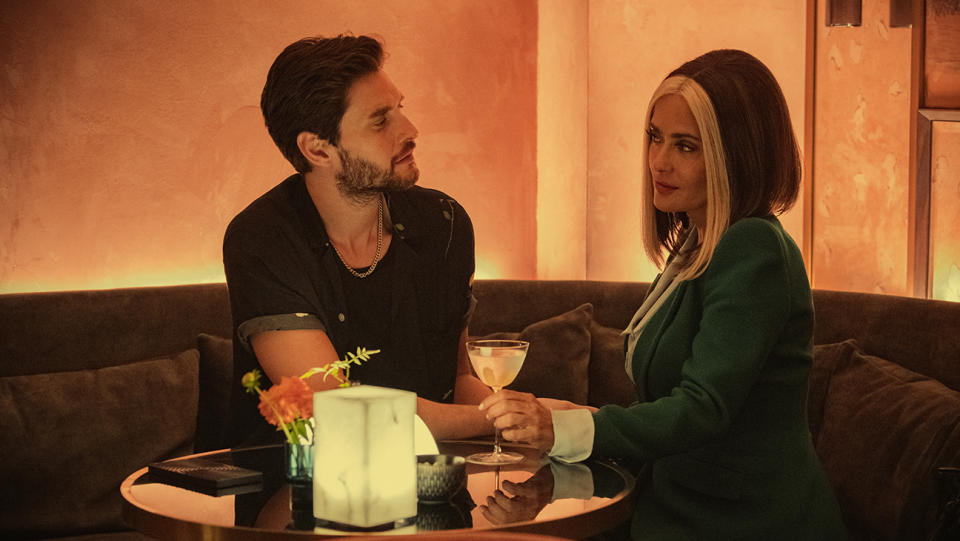
The episode focuses on the impact of the algorithm and AI, but another meta element addresses the role humans have played in creating some of that algorithmic, cameo-driven storytelling we’re seeing in Hollywood, or more specific places like the MCU. From your perspective, what messages do you think this episode says about the human role in what’s happening?
MURPHY That’s very interesting that you say that, because it is kind of like a star-studded event. There are so many recognizable faces that pop up and that do so well, by the way. I’m so proud of the whole cast. This is a good question. I feel like I’m going to just steal from Salma because when we were asked a question about how we feel about AI, I was like, “We’re all doomed.” She had a more thoughtful way of looking at it.
She was saying there could be so many upsides. These brilliant brains are creating these brilliant machines, so let’s cure cancer with that. Let’s lean into a world that isn’t just stealing people’s identities and stealing their jobs. Let’s figure out a better way that we can move forward with this technology that’s not going anywhere, that will benefit the society in which we live. But she was also saying that she does feel at her core that machines may take over to a certain degree. Yet, at the end of the day, we crave being human. No matter how advanced this technology gets, there are some things that cannot be replaced. So she feels the humans are going to triumph. I don’t know if I believe her, but I love trying to.
Ally, you noted Annie and Salma’s chemistry, which is clear from the show but also their regular interactions. Can you talk about casting and working with them on this? Particularly, when you get into the multiverse element of people playing other people who are playing themselves?
PANKIW Annie and Salma have such specific singular comedic voices and my work really focuses on just embracing comedic actors’ specificity of voice. So even though they’re very different individuals, this was an opportunity to find what the throughlines are in the way they look at the world or in their mannerisms. The thing that we all found as a throughline when we were talking about the characters and story, and building out Joan, is the commonality. The way that we all feel consumed as women in this industry and in the world. How our image is not our own in a lot of ways. I think we’ve all had an experience like that.
So that became something that was the throughline — just a woman who says: “I want autonomy.” They both have that in their own special way, and so we made sure that that was coming through in Joan. There’s also a restlessness and it shows in very different ways. Who they are on the screen is very different, but they had incredible chemistry because they’re both really brilliant, funny, funny, funny fucking women. It was electric. It was really fun, and we made sure we brought a lot of Salma’s specificity of voice, especially when she’s playing herself. We wanted that to come through in the dialogue. But also find ways in which everyone’s Joan was the same and then also with our real Joan, played by the incredible Kayla Lorette — another Canadian actress, she was there in those sessions, too. We were finding, “What is the throughline through all the Joans?” That was a really fun improv rehearsal process. Everyone shows up the first day, and we’re just improvising with Salma.
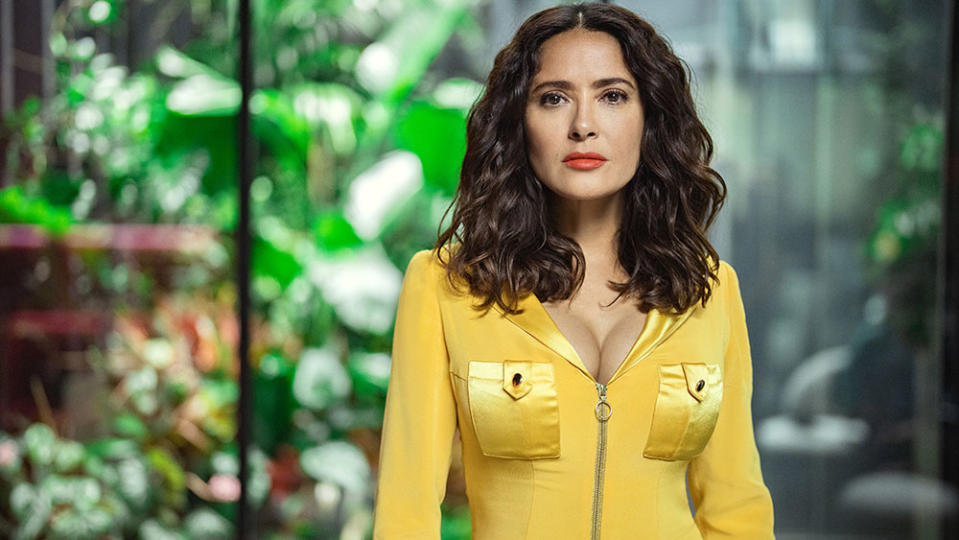
Was there any way you hinted in the show that your Joan wasn’t the source Joan? Salma’s Joan had a different “look” to it than yours, but were there any clues hidden in there for viewers?
MURPHY One thing that pops up in the show is, “Do you really think that you, who works at a record label basically, can afford an apartment like this? This is ridiculous for the salary that your character might make. This is way out of proportion.” But another thing: It was really tricky learning, eventually, that I was myself playing a character. For the first chunk I was really analyzing how I move my fingers in such a weird way, and my intonations. I was trying to bring my own characteristics into Joan, but also, no one knows what’s going on anyway. So I just kind of got in my own head about it and was overthinking everything, and trying to observe my body and my voice. Then I was like, “You know what? Charlie Brooker’s fucking got this. Just do the scripts, calm down and act it out. It’ll be OK.”
One of the biggest, funniest ways this meta relationship plays out is through the episode’s poop joke, which happens twice.
PANKIW Three times. You have to watch to the end of the credits.
That’s right! (Laughs.) OK, so how did you work with all of these actresses to deliver that joke of pooping in a church?
PANKIW Annie was so excited. Annie was like, “This is the best day of my life.” Salma was concerned, just I think because she is Catholic. She had some concerns about not wanting to be disrespectful, so we approached hers in a slightly more fantastical way. That level of the TV show is approached with a little bit more of a sheen on it, anyway. But everyone handled it the same. They burst in that church, and they squatted. And a poo is a poo. It was truly one of my favorite days on set that I’ve ever had. All the female crewmembers, we had pigtails in our hair, too, in solidarity. There’s a really funny photo of me, Kayla is in it, and I’m sort of showing her a squat position. It was just a really fun day. The conversations you have to have in this industry are so ridiculous all the time. But that day, when you’re talking about the logistics of like, people shitting? It’s just it’s always going to be fun.
Interview edited for length and clarity. Black Mirror season six is currently streaming on Netflix.
Best of The Hollywood Reporter
Tom Holland Breaks Free: Talking Zendaya, ‘The Crowded Room’ and the Future of Spider-Man
Critic's Notebook: Jerry Springer Didn't Just Reflect Our Debased Culture — He Helped Create It

